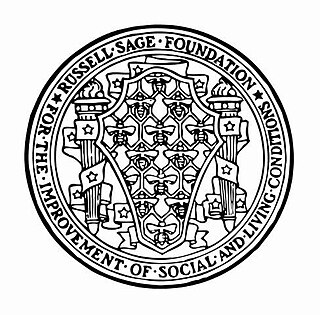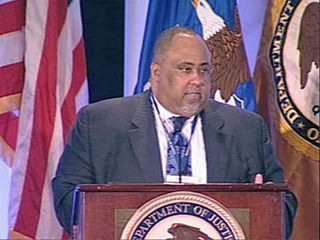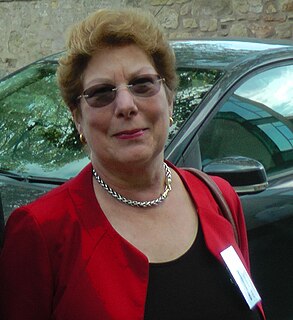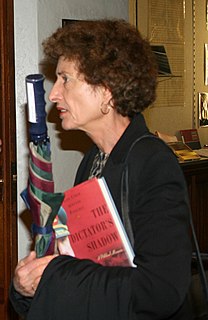Related Research Articles

The Russell Sage Foundation is an American non-profit organisation established by Margaret Olivia Sage in 1907 for “the improvement of social and living conditions in the United States.” It was named after her recently deceased husband, railroad executive Russell Sage. The foundation dedicates itself to strengthening the methods, data, and theoretical core of the social sciences in order to better understand societal problems and develop informed responses. It supports visiting scholars in residence and publishes books and a journal under its own imprint. It also funds researchers at other institutions and supports programs intended to develop new generations of social scientists. The foundation focuses on labor markets, immigration and ethnicity, and social inequality in the United States, as well as behavioral economics.
Youth studies is an interdisciplinary academic field devoted to the study of the development, history, culture, psychology, and politics of youth. The field studies not only specific cultures of young people, but also their relationships, roles and responsibilities throughout the larger societies which they occupy. The field includes scholars of education, literature, history, politics, religion, sociology, and many other disciplines within the humanities and social sciences. Youth studies encourages the understanding of experiences that are predominantly manifested among young people, generalized phenomenon and social change. The majority of 15- to 24-year-olds in 2008 lived in developing countries. The definition of youth varies across cultural contexts. The social experience and organization of time and space are important themes in youth studies. Scholars examine how neoliberalism and globalization affect how young people experience life, including in comparison to previous generations.

Margaret Levi is an American political scientist and author, noted for her work in comparative political economy, labor politics, and democratic theory, notably on the origins and effects of trustworthy government.
Wendy Berry Mendes is the Sarlo/Ekman Professor of Emotion at University of California, San Francisco, United States. She was previously the John L. Loeb Associate Professor of Social Sciences at Harvard University. Her expertise is in the area of emotion, intergroup relationships, stigma and psychophysiology. At UCSF she is the founder and director of the Emotion, Health, and Psychophysiology Lab in the Department of Psychiatry.

Scott Gates is an American political scientist and economist based in Norway. He was director of the Peace Research Institute Oslo (PRIO)'s Centre for the Study of Civil War (CSCW), which was a Norwegian Center of Excellence funded by the Research Council of Norway for a twelve-year period 2002-2013. He is currently a Research Professor at PRIO, a Guest Researcher at ESOP in the Department of Economics at the University in Oslo and also holds a professorship in the Department of Political science at the University of Oslo. He used to work at the Norwegian University of Science and Technology (NTNU) and Michigan State University (MSU).

Lawrence D. Bobo is the W. E. B. Du Bois Professor of the Social Sciences and the Dean of Social Science at Harvard University. His research focuses on the intersection of social psychology, social inequality, politics, and race.
John Thomas Jost is a social psychologist best known for his work on system justification theory and the psychology of political ideology. Jost received his AB degree in Psychology and Human Development from Duke University (1989), where he studied with Irving E. Alexander, David Goldstein, and Lynn Hasher, and his PhD in Social and Political Psychology from Yale University (1995), where he was the last doctoral student of Leonard Doob and William J. McGuire. He was also a student of Mahzarin R. Banaji and a postdoctoral trainee of Arie W. Kruglanski.

Martha Crenshaw FBA is a political scientist who is prominent for her research on terrorism. She is professor of political science at Stanford University since 2007, as well as senior fellow at the Freeman Spogli Institute for International Studies (FSI) and Center for International Security and Cooperation (CISAC).
Myron Kent Jennings is an American political scientist best known for his path-breaking work on the patterns and development of political preferences and behaviors among young Americans. He is widely held in libraries worldwide and is recognized as one of the "founding fathers" of political socialization research and theory. He is Distinguished Professor of Political Science at the University of California, Santa Barbara and Professor Emeritus of Political Science at the University of Michigan. He was elected to the American Academy of Arts and Sciences in 1982, and served as the president of the International Society of Political Psychology in 1989–1990 and as the president of the American Political Science Association in 1997–1998.
Marie Gottschalk is an American political scientist and professor of political science at the University of Pennsylvania, known for her work on mass incarceration in the United States. Gottschalk is the author of The Prison and the Gallows: The Politics of Mass Incarceration in America, published in 2006, and Caught: the Prison State and the Lockdown of American Politics, published in 2016. Her research includes investigations of the origins of the carceral state in the United States and the critiques of the scope and size of the carceral network and its intersections with race and economic inequality.

Dara Strolovitch is an American political scientist, currently a professor of gender and sexuality studies, African American studies, and political science at Princeton University. She studies the politics of race, class, gender, and sexuality in the context of intersectional societal inequality, and the representation of those who are marginalized in multiple overlapping ways.

Evelyne Huber is an American and Swiss political scientist specializing in comparative politics and a scholar of Latin America, currently the Morehead Alumni Professor of Political Science at the University of North Carolina, Chapel Hill, where she was the Department Chair for more than a decade. Her work has focused on democracy and redistribution, particularly in Latin America.
Leonie Huddy is an Australian political scientist, currently a professor of political science at the State University of New York at Stony Brook. She studies American patriotism and national identity, public opinion regarding the Iraq War, and political identity in areas like attitudes towards feminism and gendered perceptions about political candidates.
Virginia Gray is an American political scientist, currently the Robert Watson Winston Distinguished Professor of Political Science at the University of North Carolina, Chapel Hill. She studies public policy and interest groups with a particular focus on U.S. state politics. Her work on policy diffusion, which concerns how innovation in policies within one region can lead to adoptions of that policy by other regions, has been cited as foundational in developing that research topic.
Holli Semetko, frequently published as Holli A. Semetko, is an American political scientist, currently the Asa Griggs Candler professor of media and international affairs at Emory University. She has also been the Vice Provost for International Affairs, Director of the Office of International Affairs, and the Director of the Claus M. Halle Institute for Global Learning there. She specializes in political communication and media, public opinion, and political campaigns in comparative perspective.
Pamela Johnston Conover is an American political scientist. In 2007 she was named the Burton Craige Distinguished Professor of Political Science at the University of North Carolina, Chapel Hill. She studies political behavior and political psychology, with particular focuses on women and politics as well as political media studies.
Judith L. Goldstein is an American political scientist. She is the Janet M. Peck Professor of International Communication and chair of the Department of Political Science at Stanford University. She studies international political economy, with a particular focus on international trade policy.
Caroline Tolbert is an American political scientist. She is a professor of political science at the University of Iowa. She studies elections, voting, and civic engagement in American politics. Much of her work deals with peoples' capacity to use internet technology, digital technology policy, and the relationship between technology use and social participation.
Leslie McCall is an American sociologist and political scientist. She is a Presidential Professor of political science and sociology at the Graduate Center, CUNY, and the Associate Director of the Stone Center on Socio-Economic Inequality there. She studies wealth and social inequality in American society, as well as opinions about inequality, from an intersectional perspective.
Nadya A. Fouad is an American vocational psychologist. She is the Editor-in-Chief of Journal of Vocational Behavior and distinguished professor and chair of the Department of Educational Psychology at the University of Wisconsin-Milwaukee.
References
- 1 2 3 4 "Wendy M Rahn". University of Minnesota. 2010. Retrieved 24 February 2020.
- 1 2 Kim, Hannah June; Grofman, Bernard (April 2019). "The Political Science 400: With Citation Counts by Cohort, Gender, and Subfield" (PDF). PS: Political Science & Politics. 52 (2): 296–311. doi: 10.1017/S1049096518001786 . Retrieved 19 January 2020.
- ↑ Brehm, John; Rahn, Wendy (1 July 1997). "Individual-level evidence for the causes and consequences of social capital". American Journal of Political Science. 41 (3): 999–1023. doi:10.2307/2111684. JSTOR 2111684.
- ↑ "Wendy Rahn Google Scholar profile" . Retrieved 24 February 2020.
- ↑ Engerman, Stanley L. (1999). Alt, James E.; Levi, Margaret; Ostrom, Elinor (eds.). "Competition and Cooperation: Conversations with Nobelists about Economics and Political Science". The Journal of Economic History. New York: Russell Sage Foundation. 60 (2): 593–594. doi:10.1017/s002205070002564x. ISSN 0022-0507.
- 1 2 "Erik Erikson Early Career Award". International Society of Political Psychology. Retrieved 24 February 2020.
- 1 2 "Emerging Scholar Award". American Political Science Association. 2019. Retrieved 24 February 2020.
- 1 2 "Citizen Investors: The Democratization of the Stock Market and the Transformation of American Politics". Russell Sage Foundation. June 2007. Retrieved 24 February 2020.
- ↑ Rahn, Wendy; Oliver, Eric (9 March 2016). "Trump's voters aren't authoritarians, new research says. So what are they?". The Washington Post. Retrieved 24 February 2020.
- ↑ Sargent, Greg (3 July 2018). "This new study suggests Trump's racism might actually hurt him". The Washington Post. Retrieved 24 February 2020.
- ↑ Phillips, Lauren (27 September 2006). "Republicans Decide Early on Minneapolis-St. Paul for 2008 Convention". The New York Times. Retrieved 24 February 2020.
- ↑ Samuelsohn, Darren (22 April 2016). "The Rise of Trump Studies". Politico. Retrieved 24 February 2020.
- ↑ Bruinius, Harry (27 August 2018). "Who made you an expert? Is America's distrust of 'elites' becoming more toxic?". The Cristian Science Monitor. Retrieved 24 February 2020.